Just In
- 1 hr ago

- 5 hrs ago

- 5 hrs ago

- 11 hrs ago

Don't Miss
- Movies
 LSD2 Box Office Collection Day 1 Prediction: Dibakar Banerjee’s Film To Have Slow Start; Will Fail To Touch 5C
LSD2 Box Office Collection Day 1 Prediction: Dibakar Banerjee’s Film To Have Slow Start; Will Fail To Touch 5C - Finance
 1:3 Bonus Share, Rs 13.25/Share Dividend: Buy Maharatna PSU, TP Rs 355, Fundraise Approved
1:3 Bonus Share, Rs 13.25/Share Dividend: Buy Maharatna PSU, TP Rs 355, Fundraise Approved - Sports
 Michail Antonio felt officials were against West Ham after European exit
Michail Antonio felt officials were against West Ham after European exit - News
 12 Jurors Picked For Donald Trump’s Hush Money Trial, Alternate Selection Continues
12 Jurors Picked For Donald Trump’s Hush Money Trial, Alternate Selection Continues - Automobiles
 Aprilia RS 457 Accessories: A Detailed Look At The Prices
Aprilia RS 457 Accessories: A Detailed Look At The Prices - Education
 Karnataka SSLC Result 2024 Soon, Know How to Check Through Website, SMS and Digilocker
Karnataka SSLC Result 2024 Soon, Know How to Check Through Website, SMS and Digilocker - Technology
 Nothing Ear, Ear a With ANC, Up to 42.5 Hours of Battery Launched; Check Price and Availability
Nothing Ear, Ear a With ANC, Up to 42.5 Hours of Battery Launched; Check Price and Availability - Travel
Telangana's Waterfall: A Serene Escape Into Nature's Marvels
Exclusive: National Eye Donation Fortnight 2019: Understanding India’s Burden Of Blindness
Dr. Bhujang Shetty discusses the common causes of blindness and the need to pledge for eye donation.
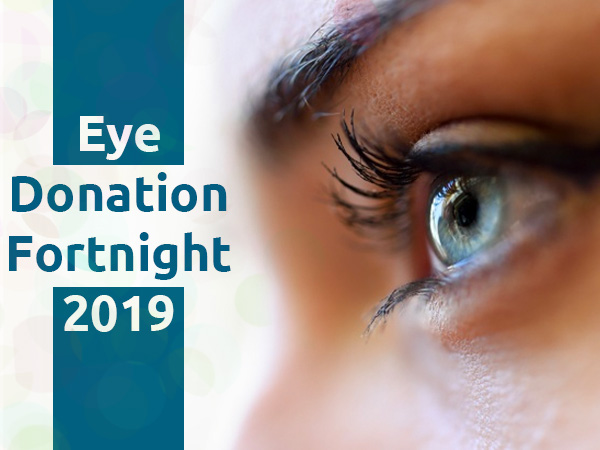
An expert interview with Dr K Bhujang Shetty.
It is said that we only realize the value of the air we breathe once we can't breathe any longer.
So is the case with our eyes, which lets us see the world around us in all its wonderful depth and colour, and sometimes haunting clarity.
A gift that we often take for granted.
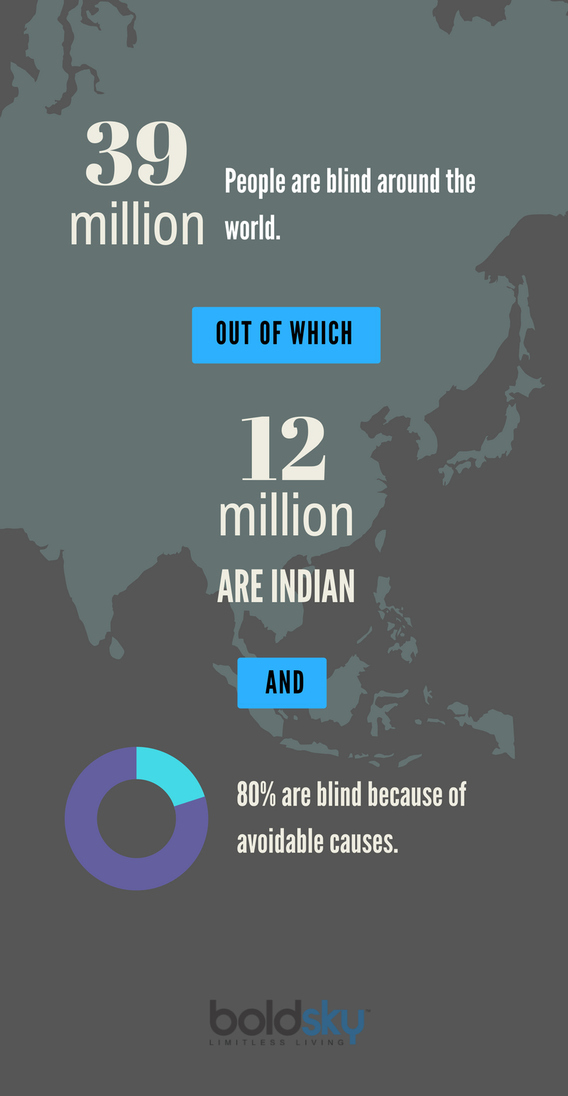
Data source: WHO Statistics on Blindness
That's why on the occasion of National Eye Donation Fortnight (25th Aug-8th Sep) we decided to learn more about this national epidemic by speaking to the renowned ophthalmic surgeon, Dr. Bhujang Shetty, founder of Karnataka's No. 1 Superspeciality Eye Hospital, Narayana Nethralaya.
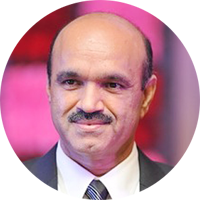
Stay tuned because you are in for a treat!
Interview Highlights You Should Not Miss
#1 The reason why 75% of all blindness is caused by avoidable causes.
#2 Why controlling your blood sugar as a diabetic will not protect you from going blind.
#3 The demand and supply logic behind medical seat scams.
...and more.
So let's dive in.

Ria: It is estimated that India has a blind population of 12 million, which is almost one-third of the estimated 39 million worldwide. So based on your experience, what do you feel is responsible for this large number?
Dr Bhujang Shetty: At present 75% of blindness in India is because of reversible causes. That means they can be corrected.
And cataract is the most common cause of it.
But the backlog of cases is definitely decreasing as more and more NGOs and private hospitals are working in rural areas and doing eye surgeries for free.

Blind girl image source: Flickr
Ria: Nevertheless, the backlog is still significantly high. What do you think is the reason behind that?
Dr Bhujang Shetty: The main problem is awareness. There is no awareness that they can get it operated and that the surgery is very simple.
Also, this condition is seen mainly in 65-70-year-old people, mainly after retirement. So he is no longer useful.
And since the youngsters in the family are daily wage labourers who need to take leave from work to take the parents to the district for an eye check-up, and then come back again for the surgery, they usually neglect to get it done.
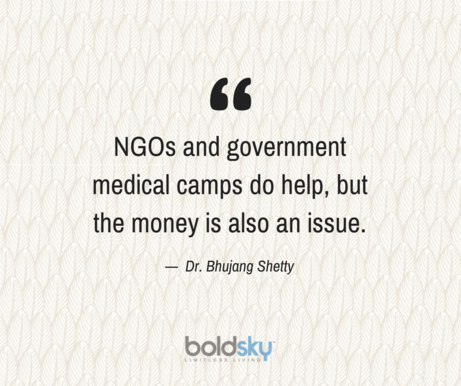
Ria: So most of the blind in our country are elderly.
Dr. Bhujang Shetty: Yes.
Ria: What about the younger generation?
Dr. Bhujang Shetty: Most of the young people have the irreversible types of blindness, like underdeveloped eyes, birth defects and weakness in the nerves.
But we are talking about eye donation, which is about corneal blindness.
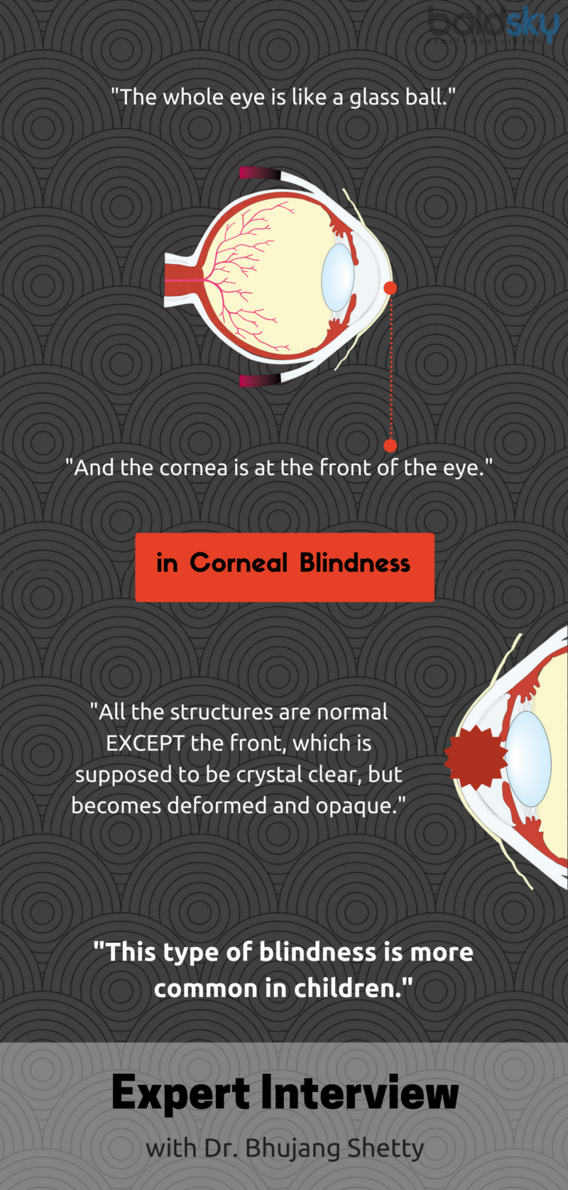
And the treatment numbers are restricted because corneal blindness can only be reversed if someone donates an eye.
In cataract surgery, there is no limitation.
But corneal blindness has a limiting factor because there is no such thing as an artificial cornea. So we need a donor's eye.
Ria: What about diabetic retinopathy?
India is the Diabetes Capital of the World. So does diabetic retinopathy contribute significantly to the total percentage of the blind in our country?
Dr. Bhujang Shetty: Diabetic retinopathy is quite common. It accounts for 5% of blindness.

And initially it was only in the cities, but now more and more diabetics are there in rural areas as well.
And as the number of diabetics increases, so does [the prevalence of] its complications related to the eye, kidney and heart.
People have a longer life span now, so they have diabetes for longer periods. Therefore, diabetic retinopathy and other related diabetic diseases are also rising.
And since diabetes cannot be completely cured, regular eye check-ups are advised.
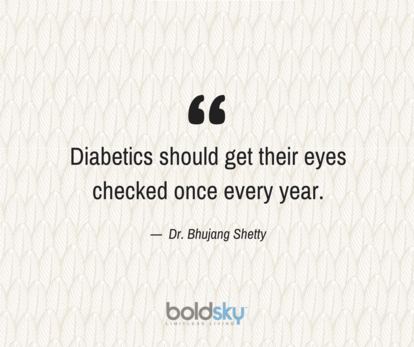
Because in the long run, like 15-20 years, it is likely to affect the eyes. And [eye check-ups] can find the problem and take preventive measures to postpone the complications [like blindness].
And while optometrists are qualified to give you glasses, if you are a diabetic you should only go to an eye surgeon.
In fact, sometimes patients will ask me why do they have to visit me for check-ups if they have kept their sugar under control.
But even with sugar under control, diabetics can get eye complications in 10-15 years.
So it is important to get regular check-ups and maintain your blood sugar.
Ria: Now let's talk about WHO's Vision 2020.
WHO has set a very optimistic goal of the complete elimination of preventable blindness from the world by the year 2020. And though it is estimated that some countries will succeed in achieving this, do you think India can?
Dr Bhujang Shetty: We may be able to reduce [the number] to some extent, but there is no question of eliminating [the problem]. We can just reduce the backlog.
Ria: So what can we do to solve this crisis more effectively?
Dr Bhujang Shetty: As I said, the awareness that the surgery is simple is very less. Also, economic reasons play a role. Affordability is a factor. And old villagers need someone to come along with them, which is difficult.
Ria: But from a more technical point-of-view, our country has only 12,000 ophthalmologists, which means there is 1 eye specialist for every 90,000 people. What do you think we can do to improve this ratio?
Dr Bhujang Shetty: There is definitely a restriction.
See, 100 [students] pass out from MBBS every year, but only 10 get post-graduation seats. So there should be more opportunities.
It's a problem of demand and supply. That's why medical seats are sold for 1-2 crores.
Number of [medical] seats must be increased. People who want to study must be given the opportunity. And they must pass the test.
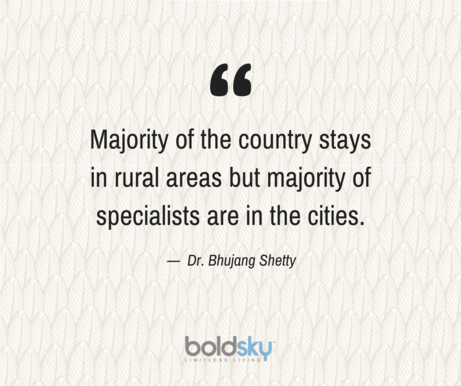
Ria: So if the number of doctors increases, would it help decrease the number of blind people in our country? Because the trend is that doctors prefer to migrate to urban areas and don't prefer working in rural locations.
Dr Bhujang Shetty: When we have sufficient specialists [in the cities] there will be an excess so they will have to migrate to the rural areas.
When the demand is there in the bigger cities, they will stay here. But when the cities are overcrowded, they will trickle into the smaller places so they can survive.
Ria: Now let's discuss the present scenario of eye donation in India.
We need over 2,00,000 eyes for vision restoration every year, but at present only an estimated 45,000 eyes are collected all over the country. And out of those, only 46% are usable.
What can we do to change this scenario?
Dr Bhujang Shetty: Definitely there is a huge gap between demand and supply.
People are waiting for corneal transplants, but the number of eyes collected are less, out of which only 20-30% can be used because of the age of the donor, diseases, etc.
This number has to go up. So we have to increase awareness of pledging.
But it's just a pledge.
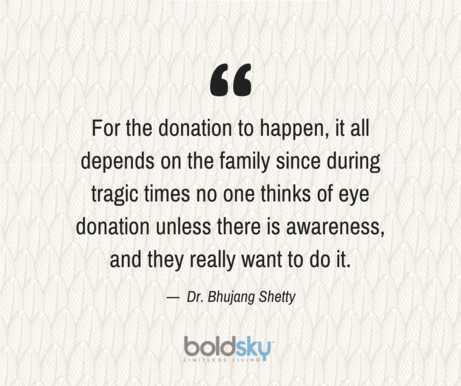
Infrastructure to collect eyes must also be there.
The number of eye banks is less. And in smaller towns there are none. So if someone wants to donate his eyes, who will he contact?
And if they live 100 km away from the eye bank, the bank won't be able to reach them on time because there is a time limit to donation [4-6 hours after death].
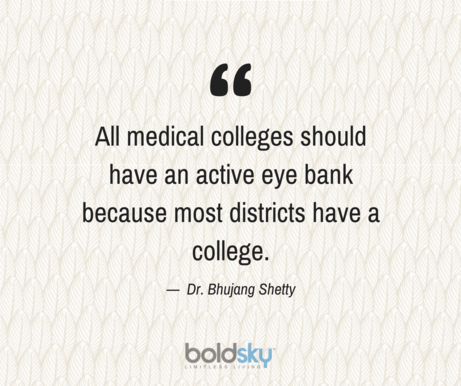
Ria: So there is no centralized approach to collecting eyes?
Dr Bhujang Shetty: The network is not well-developed.
When I was a student, there were hardly any eyes collected. And then I went to Sri Lanka for a [medical] camp.
There they have enough eyes to give all over the world. A small country like Sri Lanka!
So I enquired about it and found the reason.
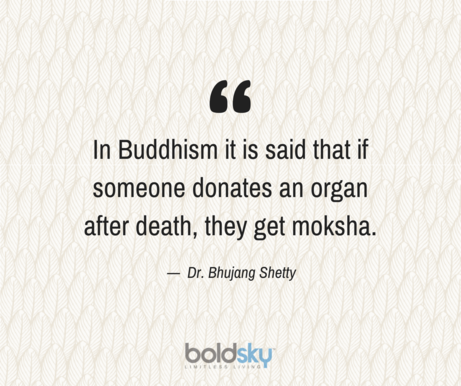
That's why the majority of Buddhists want to donate their eyes there.
So then I thought, why not in a city like Bangalore where there are almost 300 - 400 deaths every day?
So I approached Dr Rajkumar, and he agreed to join the campaign and give it the credibility of his name.
That's how Dr Rajkumar Eye Bank was opened at Narayana Nethralaya in 1994.
Ria: Can you tell us a little bit about this eye bank?
Dr Bhujang Shetty: Our eye bank collects the highest number of eyes in Karnataka. It is almost one-third in the entire state.
Ria: And how many visions have you and your staff restored in the last 5 years?
Dr Bhujang Shetty: On average we collect 1,500-1,600 eyes every year, out of which only 30-40% can be used.
We have a huge waiting list, and according to it, we call people for transplants.
We also have 50,000-60,000 people on our pledge list at Narayana. But this is very nominal.

Dr Rajkumar also pledged his eyes, and after his death, they were donated. Even his wife's eyes were donated after her death. In fact, his 3 sons have pledged their whole bodies.
Ria: That is truly amazing!
So what do you think helped Narayana Nethralaya become Karnataka's No. 1 super speciality eye hospital?
Dr Bhujang Shetty: I started as a one-man-army some 30-35 years ago. And I made it patient-centric.
If the patient is happy, the money will follow. We don't have a marketing team at Narayana.
Ria: So it spreads by word of mouth.
Dr Bhujang Shetty: That is the best way.
Ria: Now this question may seem off-topic, but while I was doing my research, I came across something called the Tear Science Lab on your website.
The name is so interesting. What is it all about?
Dr Bhujang Shetty: It's a research lab.
We have got a lot of PhD eye specialists here. Even Dr Rohit Shetty has done a lot of research in the lab.
The idea is we should be able to collect a drop of tear and analyze it to find out diseases.
Ria: That's great!
I have just one final question for you.
If everything you have worked on till date was erased from the face of this planet, and you could just pass on to the world 3 truths of life that you have experienced, what will they be?
Dr Bhujang Shetty: Live your life knowing who you are and do your work to the best of your ability. And don't worry about the fruit.

Like it is said in the Gita, the fruits of our actions are not in our hands. Just give your best.
Did You Enjoy Reading This Article?
Dr Bhujang Shetty is not just an expert eye surgeon. He is also a spiritual man with a kind heart.
That's why I loved interviewing him.
And since you are still reading this, I think you enjoyed reading his words too.
So if you did, please show us your appreciation by hitting the heart button below and sharing this article with your family and friends.
And while we are at it, why not pledge your eyes for donation?
I did it.
So can you.
Have a great day!

-
 wellnessWorld Sight Day 2022: Early Detection And Management Is Key To Prevent Glaucoma Related Blindness
wellnessWorld Sight Day 2022: Early Detection And Management Is Key To Prevent Glaucoma Related Blindness -
 diabetesWhat Is Diabetic Retinopathy? Stages, Symptoms, Risk Factors, Treatments And Prevention
diabetesWhat Is Diabetic Retinopathy? Stages, Symptoms, Risk Factors, Treatments And Prevention -
 wellnessWhat Is Bionic Eye? Know About World's First Bionic Eye To Fully Restore Vision In Blind People
wellnessWhat Is Bionic Eye? Know About World's First Bionic Eye To Fully Restore Vision In Blind People -
 wellnessCan Vitamin A Deficiency Cause Blindness?
wellnessCan Vitamin A Deficiency Cause Blindness? -
 wellnessWorld Sight Day 2019: Date, Theme And History
wellnessWorld Sight Day 2019: Date, Theme And History -
 insyncWorld Sight Day 2019: Famous People With Visual Impairments
insyncWorld Sight Day 2019: Famous People With Visual Impairments -
 disorders cureNational Eye Donation Fortnight 2019: What Causes Blindness, Its Types, Symptoms And Treatment
disorders cureNational Eye Donation Fortnight 2019: What Causes Blindness, Its Types, Symptoms And Treatment -
 disorders cureBreakthrough: Stem Cell Technology Can Cure Blindness Caused By Macular Degeneration
disorders cureBreakthrough: Stem Cell Technology Can Cure Blindness Caused By Macular Degeneration -
 wellnessCommon Causes Of Blindness In Children And Adults
wellnessCommon Causes Of Blindness In Children And Adults -
 disorders cureEat These Foods To Improve Night Vision
disorders cureEat These Foods To Improve Night Vision -
 disorders cureBring Light Into Your Eyes With Artificial Retina
disorders cureBring Light Into Your Eyes With Artificial Retina -
 disorders cureGlaucoma Starts In Brain Not Eye
disorders cureGlaucoma Starts In Brain Not Eye


 Click it and Unblock the Notifications
Click it and Unblock the Notifications



